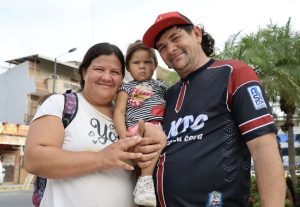Venezuelan refugees accepted by 17 countries
More than 4.5 million migrants and refugees from Venezuela have obtained regular status in 17 countries in Latin America and the Caribbean since 2019, according to the United Nations.
Praising reginal governments, the UN said the number was achieved thanks to the proactive measures taken by host governments within their legal frameworks, and financial support from the international community, enabling them to access documentation, regularisation mechanisms and recognition of refugee status.
This year more than 1.3 million refugees and migrants benefited from opportunities for integration, protection, and humanitarian assistance through the regional Refugee and Migrant Response Plan (RMRP), coordinated by the Regional Inter-Agency Coordination Platform for Refugees and Migrants from Venezuela (R4V) and co-led by the International Organization for Migration (IOM) and UNHCR, the UN Refugee Agency, the UN said.
“Despite this significant progress, persistent challenges such as economic and political instability, insecurity, and social inequality hinder migrants and refugees from providing for their families in their host countries,” a statement from IOM said.
“Regularisation efforts and the reinforcement of refugee status determination procedures in Latin America and the Caribbean must be complemented by robust stabilisation and socioeconomic integration initiatives, including education, health care, validating professional qualifications and providing access to formal labour markets, livelihood opportunities and banking services,” the statement said.
“Without these essential steps, the challenges of irregularity and informal labour will persist, leading to onward movements and exacerbating human trafficking and smuggling risks.
UNHCR and IOM Joint Special Representative for Refugees and Migrants Eduardo Stein, said the integration of refugees and migrants is crucial for building inclusive and resilient societies.
 “When migrants and refugees are empowered to contribute fully to their communities, they enrich the social fabric while driving economic growth and innovation. By ensuring access to essential services, like labour markets and social networks, we create a win-win situation for refugees, migrants, and host communities,” he said.
“When migrants and refugees are empowered to contribute fully to their communities, they enrich the social fabric while driving economic growth and innovation. By ensuring access to essential services, like labour markets and social networks, we create a win-win situation for refugees, migrants, and host communities,” he said.
The R4V’s regional Refugee and Migrant Needs Analysis (RMNA) 2024 estimates that among the 6.7 million Venezuelans living in Latin America and the Caribbean, 82 per cent are working in informal jobs, more than one third are in an irregular situation, and 53 per cent are facing barriers to accessing health care. Many also earn unfair wages, leaving 42 per cent unable to provide enough food for their families and 23 per cent living in overcrowded conditions.
Among migrants and refugees of other nationalities in transit in the region, these needs are even higher, with up to 90 per cent lacking essential services like food, protection, and shelter.
“To address these pressing needs and prevent unnecessary and dangerous successive movements, the R4V Platform launched today its 2025-2026 regional response plan, requiring $US1.4 billion in its first year. This funding will support more than 2.3 million vulnerable refugees and migrants and their host communities in 17 countries of Latin America and the Caribbean,” IOM said.
“To turn this plan into action, the international community’s commitment to providing robust and sustained solidarity and financial support to host countries and to the partners of the R4V Platform is essential.
“By securing this funding, life-saving assistance and long-term initiatives will be implemented that foster successful stabilization, and socioeconomic integration while addressing discrimination and improving access to documentation, health care, education, and decent employment,” IOM said.
The countries that have accepted Venezuelans include Argentina, Aruba, Bolivia, Brazil, Chile, Colombia, Costa Rica, Curaçao, Dominican Republic, Ecuador, Guyana, Mexico, Panama, Paraguay, Peru, Trinidad and Tobago, and Uruguay.
“In 2025, the RMRP will be implemented by 230 partner organisations, including United Nations agencies, international and national non-governmental organisations, civil society, refugee and migrant-led organizations, the Red Cross Movement, other community-based organisations, the World Bank, and academia,” IOM said.












